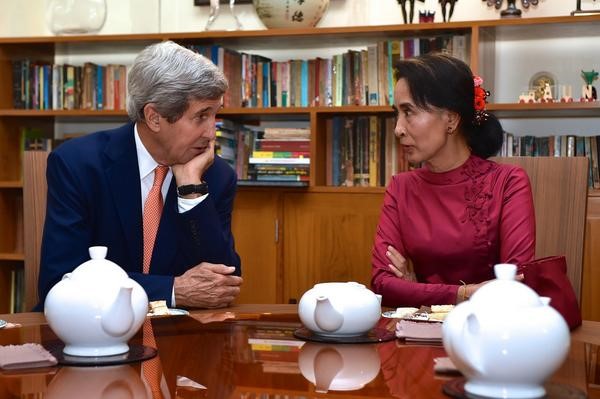Myanmar last week played host to the gatherings of the Association for Southeast Asian Nations (ASEAN) as chair of the organization this year. So far, Myanmar has received mixed reviews from the international community on its performance of the chairmanship. Some criticized Myanmar for failing to seriously address the issue of South China Sea. Some congratulated Myanmar for its own political reforms that also saw a rapprochement between Nay Pyi Taw and Washington. US Secretary of State John Kerry attended the ASEAN Regional Forum and had a chance to meet with the democratic icon, Aung San Suu Kyi. Kerry cautioned that Myanmar had a long way to go before becoming a full-fledged democratic nation.

US Secretary of State, John Kerry, met with Myanmar’s Aung San Suu Kyi
Coming half way now, Myanmar may wish to assess its role as ASEAN chair and look ahead into the rest of the year to anticipate obstacles. In retrospect, the chairmanship a year before the materialization of the ASEAN community building in 2015 is important both in tangible and symbolic terms for Myanmar. 2015 will be an important year for Myanmar’s domestic politics—a general election will be held for the second time since 2010. Tangibly, since Myanmar is undergoing a series of reforms, assigning the chairmanship to the country seemed rational in the eyes of the region. Symbolically, Myanmar would fulfill its need of hosting the ASEAN Summit for the first time since it joined the grouping in 1997, just before ASEAN crosses another significant threshold of transforming itself into a political, economic, and socio-cultural community.
However, for the next six months, many questions remain unanswered. The situation of human rights in Myanmar has not been resolved, with the Rohingya being persistently mistreated. How will Myanmar handle its human rights situation and at the same time preside over the ASEAN Intergovernmental Commission on Human Rights (AICHR)? Difficult questions will also be asked in terms of how ASEAN will respond to such human rights abuses in the country. What are measures to be put in place in case Myanmar backtracks on its political reforms while serving as ASEAN chair?
For Myanmar, domestic affairs have certainly dictated its role as chair of ASEAN. Political reforms in Myanmar have progressed in 2014. But opening up the country without dealing with critical internal problems would not satisfy ASEAN members and the international community. Ethnic conflicts inside the country already tested the Myanmar leadership in an urgent need to promote domestic peace and in the meantime regional security. This is because issues like ethnic conflicts and the maltreatment against the Muslim Rohingya had never been confined within the borders of Myanmar. They have long produced regional impacts too. Thailand, for example, has had to bear the brunt of ethnic conflicts in Myanmar. Recently, Thailand has served as one of the main destinations for the Muslim Rohingya seeking refuge as they fled intensifying communal violence. Failing to settle these problems would not only jeopardize Myanmar’s relations with neighboring countries, but also its position as ASEAN chair and the credibility of the organization, particularly that of the AICHR.
Domestic crisis in Myanmar also raised a significant issue of whether ASEAN, at Myanmar’s helm, would finally overcome its traditional principle of non-interference. Certainly, Myanmar’s ASEAN leadership in the case of Rohingya has been monitored closely by other Muslim members of ASEAN, including Indonesia, Malaysia, and Brunei. A success, if any, could set a new precedent in dealing with ethno-religious conflicts in the region, as seen in the case of Thailand and the Philippines.
Other contentious issues that also put ASEAN chair to the test will continue to be the South China Sea dispute. Myanmar is not directly involved in the conflicts, but this fact did not make it easier for Myanmar to address the issue without upsetting any conflicting parties, particularly China. As Myanmar’s Presidential Spokesman U Ye Htut emphasized, “China and Myanmar have had a good neighbourly relationship for many years; it is not a hindrance but an advantage in the case of the South China Sea.” Cambodia, as ASEAN chair in 2012, proved that it valued its bilateral ties with China at the expense of its chairmanship of ASEAN. For the first time since 1967, ASEAN was unable to agree on a joint statement at the end of the long meeting to find a breakthrough in the South China Sea dispute. As currently evident, Myanmar kept the issue a low profile, even when it sparked concern from the United States over ASEAN’s inability to deal with the issue and over ASEAN being manipulated by China.
As for the Thai political conflict as a result of the coup, a concern is that Myanmar may lack an interest in the issue. Myanmar’s readiness to play a mediating role would be crucial, particularly being an immediate neighbor of Thailand. Apart from managing intra-regional conflict, Myanmar was expected to engage China and India, the two regional powers that have over the years forged close relations with ASEAN. As Vignesh Ram suggests:
Myanmar has long been regarded as a bridge between the two great civilizations of India and China. Its role in security and stability directly impact India, China and ASEAN. Hence, ASEAN should work closely to integrate Myanmar with both these countries, giving it crucial guidance into effectively working the ASEAN agenda of balancing extra-regional presence in the region. This will help ASEAN maintain its centrality and the delicate balance in Southeast Asia that keeps fortune in the region alive. Within this context, the ASEAN chairmanship will be a crucial test for Myanmar’s own move towards democracy and prosperity.
The challenges for ASEAN are no less intense. Awarding Myanmar with a chairmanship even when the country’s has still been encountering major internal problems has added a degree of pressure on ASEAN as a whole. In the year leading up to the Myanmar’s ASEAN chairmanship, it was evident that ASEAN strove to ensure that Myanmar continued its political reforms. One way of such ensuring this was through capacity building in Myanmar, sponsored by ASEAN, especially in consolidating democratic institutions.
Additionally, ASEAN was eager to work with Myanmar in lessening the latter’s problem with the Muslim Rohingya. It is important for ASEAN states to achieve internal consolidation. Thus, realistically speaking, ensuring Myanmar’s smooth ASEAN chairmanship, with minimal internal conflicts in that country that would damage the reputation of ASEAN, would be the utmost objective of the organization.
 Pavin Chachavalpongpun is associate professor at Kyoto University’s Center for Southeast Asian Studies.
Pavin Chachavalpongpun is associate professor at Kyoto University’s Center for Southeast Asian Studies.
Prachatai English is an independent, non-profit news outlet committed to covering underreported issues in Thailand, especially about democratization and human rights, despite pressure from the authorities. Your support will ensure that we stay a professional media source and be able to meet the challenges and deliver in-depth reporting.
• Simple steps to support Prachatai English
1. Bank transfer to account “โครงการหนังสือพิมพ์อินเทอร์เน็ต ประชาไท” or “Prachatai Online Newspaper” 091-0-21689-4, Krungthai Bank
2. Or, Transfer money via Paypal, to e-mail address: [email protected], please leave a comment on the transaction as “For Prachatai English”
